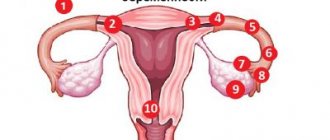Sometimes, while waiting for your period to start, you feel some discomfort, but your period never comes. This leads to doubts about whether pregnancy has occurred?
The first symptoms of pregnancy are similar to symptoms of PMS. Each girl experiences different unpleasant sensations, but the most common ones can be noted:
- swelling and sensitivity of the mammary glands;
- drowsiness;
- cravings for certain types of food;
- increased sensitivity to odors;
All these manifestations are associated with changes in hormonal levels in the body. The balance of progesterone and estrogen is disrupted, which affects the neuro-emotional state and causes deterioration in well-being. Let's look at this in more detail.
Chest pain
Swelling and chest pain are characteristic of both PMS and pregnancy. This is due to changes in hormone levels, so this sign is not decisive. The only thing you can take into account is the duration of this condition.
During pregnancy, this symptom accompanies the young mother all the time, as processes associated with lactation occur in the chest.
With PMS, this symptom lasts for several days. Discomfort in the back Back pain during pregnancy occurs much later, closer to the third trimester. In the early stages, this is not a characteristic sign; it may occur due to a state of general malaise. More pronounced back pain occurs with PMS.
When gynecological factors have nothing to do with it
Sometimes painful manifestations are in no way related to gynecological and obstetric problems. For example, expectant mothers often want to eat completely incompatible foods: pineapples with smoked sausage or salted herring with strawberries, etc. Such gastronomic perversions are fraught with the development of digestive disorders or bloating, which can cause pain reminiscent of menstrual syndrome. Therefore, mommy should be more careful with food experiments.
Stomach pain can also occur due to renal pathologies such as pyelonephritis or glomerulonephritis, which are quite common during pregnancy. In such a situation, the clinical picture is complemented by pain in the renal area and severe swelling. In such a situation, it is difficult to solve the problem on your own, so the help of a specialist is needed.
Bloody issues
Bloody discharge during pregnancy is not profuse, more spotting and lasts 2-3 days, general health is better than during normal menstruation. This discharge may begin a little earlier than the expected period, and can be brown or brown in color.
Bloody discharge during pregnancy is explained by the process of attachment of the embryo in the uterine mucosa. Such phenomena do not happen often during pregnancy, but 2 of my friends experienced this.
Every woman should listen very carefully to her body, then such symptoms will not go unnoticed. This symptom is quite indicative. It is important to learn to determine the difference between spotting during pregnancy and menstruation.
Nausea
PMS may also be characterized by nausea, but this is a short-term and rare phenomenon, and occurs much earlier than during pregnancy.
Early toxicosis of pregnant women leads to aversion to food. Nausea occurs not only in the morning, but throughout the day at any time. Under the influence of unpleasant odors, toxicosis intensifies.
Usually this symptom occurs after 5 weeks, which is associated with the vital processes of the fetus. The metabolism has not yet been established, and fetal decay products enter the mother’s blood and cause minor intoxication. This continues until 4-5 months, while the placenta matures. Vomiting may occur periodically.
This symptom may manifest itself differently in one woman during different pregnancies. My friend did not have toxicosis while expecting a boy, but when she became pregnant with her daughter, nausea and vomiting accompanied her constantly. From my own experience, I will say that toxicosis accompanied me from 5 to 16 weeks, but for two of my friends, it clearly stopped at 12 weeks. Several of my good friends did not suffer from it at all.
Cravings for certain types of food
During pregnancy, food tastes often change, cravings for certain foods arise, and familiar foods can cause disgust. The expression “craving something salty means pregnancy” is known to everyone, and this is understandable; there is often a desire to eat sweet and salty foods.
In the early stages of pregnancy, women may experience a feeling of hunger, this is due to significant energy expenditure by the body at the time the fertilized egg moves through the fallopian tubes and its implantation. This process takes up to two days.
But such a symptom is also not decisive, since from my own experience I will say that before PMS my appetite greatly increases, like most of my friends. This is also understandable from a physiological point of view - the body accumulates nutrients before significant blood loss.
Aching pain in the lower abdomen
During pregnancy - short-term, non-intrusive and sluggish.
With PMS, the pain is more severe and unpleasant, and there is bloating, especially on the first day. A third of my friends have a tummy tug throughout their period. There are also lucky women who do not experience such unpleasant sensations.
When pregnancy occurs, the egg is fertilized, and the uterus begins to prepare for its implantation. During the attachment of the fruit egg to the mucous membrane, unpleasant sensations are possible. Before menstruation, the reverse process occurs - the mucous membrane peels off, which is released during menstruation. It gives a similar feeling. In both cases, the pain is of a different nature.
Sudden changes in emotional state
During pregnancy, mood swings are extreme, emotions are stronger and appear more vividly. One of my friends, in the early stages of pregnancy, wanted to cry all the time, she felt sorry for everyone and was offended to the point of tears, or she simply laughed merrily at an insignificant joke. Moodiness and causeless anxiety also constantly accompany a woman.
With PMS, negative emotions, increased nervous tension, panic attacks, anger, and anger are more often present. Everything returns to normal with the start of menstruation.
It is this indicator that most often catches the eye of others. The nature of this symptom is related to hormones, but there are also differences in its manifestation.
Fatigue and dizziness
During pregnancy, there is a sharp increase in progesterone levels, which causes increased fatigue in the first weeks.
- There is a decrease in blood pressure and sugar levels
- The total amount of blood in the body increases
This causes deterioration in well-being and dizziness. Characteristic features include absent-mindedness and fatigue. Before the onset of menstruation, similar changes occur, but as they begin, progesterone levels decrease and fatigue goes away.
Drowsiness
During pregnancy, drowsiness occurs quite often and this is of a protective nature. The body is trying to protect the little child from the excessive emotionality of his mother, the woman becomes more lethargic, wants to sleep all the time, and “not run to the front line and rush into battle.”
During my pregnancy, I simply slept through the entire first trimester, I was extremely sleepy:
- in the morning
- at lunch
- In the evening
There are women who experience insomnia during this period.
With PMS, this symptom is short-term.
This symptom occurs against the background of general fatigue of the body.
Sensitivity to odors
This symptom appears one of the first in early pregnancy. A woman feels morning sickness. Some smells are particularly disgusting. Most often this concerns the odors of household chemicals, toilet water, perfumes, odors from food, especially during their preparation. All “aromas” are felt very sharply.
During her pregnancy, my good friend simply could not go into the kitchen and open the refrigerator, she had difficulty traveling on public transport, everything smelled terrible to her. It is especially unpleasant to experience this period in the summer, when heat is added to all the irritating factors, which simply intensifies it.
During PMS, sensitivity to odors also occurs, but it does not manifest itself as strongly and does not last long.
Associated symptoms
This article talks about typical ways to solve your issues, but each case is unique! If you want to find out from me how to solve your particular problem, ask your question. It's fast and free
!
A woman should worry about severe pain that does not go away for a long time and affects not only the abdominal cavity, but also the lower back. Similar discomfort, for example, is observed in many gastrointestinal diseases.
In addition, depending on the location, pain may indicate various diseases:
- Appendicitis. The pain in this disease is aching in nature, occurs on the right side of the abdominal cavity and can radiate to the leg.
- Inguinal hernia. It is characterized by such symptoms as the sudden onset of sharp, gradually increasing pain, a feeling of tension when touching painful areas.
- Colitis. Accompanied by rumbling and bloating, a feeling of fullness and heaviness in the abdominal cavity, and a constant feeling of squeezing. The pain is very strong, similar to colic.
- Osteochondrosis. Characterized by pain in the lower back, legs and groin.
If at least one of the above symptoms is present, a woman urgently needs medical help. Delayed treatment may cause termination of pregnancy.
How to determine exactly
None of the above signs are 100% decisive; you can guess about a possible pregnancy or have doubts. Even the absence of menstruation does not definitely indicate pregnancy.
Delays can be caused by severe stress, overwork at work, emotional overstrain, perhaps you have exams or a difficult interview, you quarreled with your loved one; may be associated with climate change, or be a signal of the development of a disease. To eliminate any doubts, the best method is to use a pregnancy test.
All tests have the same principle; they react to the level of a hormone in the urine - human chorionic gonadotropin (hCG). There are different types of tests:
- Test strips are not expensive. The test is a strip with markings applied to it. The test must be placed in a container with morning urine. After a few seconds, place the material on a horizontal surface and wait until the indicator strip reacts to the hormone level. Morning urine contains the highest concentration of hCG, so the result will be more reliable. Two lines on the test indicate that the woman is pregnant. If the result is short, the result may be incorrect; it is better to recheck after some time.
- The tablet test is relatively new and convenient. It has great sensitivity, which makes it possible to detect pregnancy in the early stages. The test looks like a tablet with windows. A small amount of urine must be applied to a special window where there is a colorless cloth with a reagent. When urine comes into contact with fabric, it reacts, colors it, and the result is visible in another window. This test is more effective.
- The jet test is one of the new modern types. It is a small plastic device, at the end there are strips with applied sensitive particles that immediately react to the presence of the hCG hormone in the urine. It has very high accuracy and reliability.
- The electronic test is very convenient and comfortable. In appearance it resembles an inkjet, but has a special screen on which there will be an inscription: “pregnant” - you are pregnant, and “not pregnant” - you are not pregnant.
If you have done the test and have doubts, you can do a laboratory blood test for hCG. Remember, every woman is individual and unique, no one can understand her body better than her. PMS is a monthly phenomenon, and each of us knows best what special symptoms it is accompanied by. Listen to your body and you will definitely notice if any changes occur.
For additional reading
The menstrual cycle involves a huge and complex work of the body, which is preparing for the conception of a child. In the middle of the cycle, an egg is released from the ovaries and prepares for fertilization. An additional mucous layer forms in the uterus, which will receive the unborn baby.
If fertilization does not occur, then the body begins to get rid of the results of its achievements, and next month everything will start all over again. Before the start of a new cycle, a number of changes occur in the female body, which occur a few days before the onset of menstruation and are called premenstrual syndrome (PMS). Every second woman notices manifestations of PMS, but in my environment, individual signs are found in all my female friends and acquaintances.
Other symptoms:
- back discomfort;
- aching pain in the lower abdomen;
- sudden changes in emotional state;
- fatigue and dizziness;
- nausea and vomiting;
- bloody issues.
Dangerous reasons for having periods during pregnancy
Among the most common deviations are the appearance of discharge several days earlier, its abundance is less than usual, unusual color of menstruation, the duration of menstruation is shorter than always. The appearance of two colored stripes on the test indicator clearly indicates successful conception. Spotting does not serve as clear evidence to the contrary. Bloody discharge or other unusual discharge occurs in most women who have recently become pregnant. Most often they do not identify pathologies and are harmless to mother and baby. However, in some cases, bleeding indicates the onset of an ectopic pregnancy or fetal death, as well as a miscarriage. To ensure your safety, it is highly recommended that you undergo additional examination by your gynecologist. Considering the above, spotting in the initial weeks of pregnancy is a common occurrence. A woman's consultation with a gynecologist is the best decision when it is detected. The appearance of blood can be completely safe, as during implantation, or cause harm to the body, as during an ectopic pregnancy.











